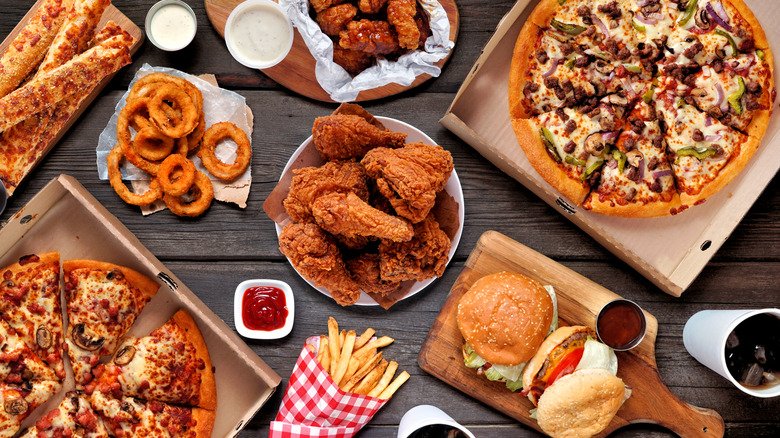New Study Reveals The Real Reason Most People Avoid Fast Food
Let's face it: it can be difficult to say no to fast food. Other than the fact that it is everywhere, fast food is convenient and fairly affordable, making it an easy way to grab a bite, particularly when time or money is tight. Fast food also appeals to our taste buds, because not only does it smell appetizing, but most fast food items have a great mouthfeel — and they're packed with fat and sugar (via How Stuff Works).
Small wonder then that statistics published by The Barbecue Lab show most Americans have a fast food meal anywhere from one to three times a week; that more than 30% of Americans eat fast food every day; and that 83% of families eat fast food at least once a week. Another surprising fact about fast food: people who earn more generally eat more fast food than those who earn less. But what those statistics don't reveal is why people work so very hard to avoid fast food, which is not for the reason you might think.
Guilt is the main reason most people avoid fast food
Even though most people know fast food isn't exactly nutritious, a new study shows that the main reason most people avoid fast food isn't because they want to be healthy, but because they feel guilty when they have it.
The paper, which is set to publish in "Food Quality and Performance" in July 2022, studied the behaviors of more than 300 respondents who were given an online questionnaire so researchers might determine what factors set regular fast food consumers apart from non-regular ones. The researchers, led by Kent State University's Kiwon Lee, said they undertook the survey because they found that "reasons for not consuming fast food [are] relatively unknown, other than anecdotal assumptions that low nutritional quality of fast food may discourage fast food consumption" (via Science Alert). The group subsequently found that "[regular consumers] were found to consume fast food due to convenience and taste whereas non-[regular consumers] were found to avoid fast food due to the feelings of guilt when consuming fast food and the sense of accomplishment when not consuming fast food."
But perhaps people would feel less guilty about fast food if they were aware of the results of another, earlier study.
Past studies indicate those feelings of guilt are misplaced
While it has been assumed by many that the rise in obesity is tied to fast food and snack food consumption, researchers have in the past said that to establish causality between regular fast food consumption and obesity would be too simplistic.
Cornell University professors David Just and Brian Wansick studied data from 2007 to 2008, which looked at people's food habits based on their body mass index (BMI), and they found that, except in cases where people were either overweight or underweight, "consumption of soda, candy, and fast food showed no correlation to BMI."
"These are foods that are clearly bad for you and if you eat too much of them they will make you fat, but it doesn't appear to be the main driver that is making people overweight and obese," Just said. "For 95% of the country, there is no relationship between how much fast food and junk food they're eating and their weight," he explained in an interview on the study (via MedicineNet).
Just adds that: "By targeting just these vilified foods, we are creating policies that are not just highly ineffective, but may be self-defeating as it distracts from the real underlying causes of obesity."


